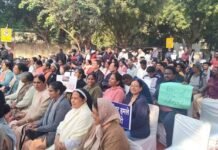The Independent Inquiry into Child Sexual Abuse has today published new research exploring the many challenges staff in residential schools face to safeguard pupils and handle child sexual abuse.
The ‘Safeguarding Children from Sexual Abuse in Residential Schools’ report explores the views of staff, pupils, parents and local authorities, building on previous research.
Researchers held interviews and focus groups with more than 150 people, as well as examining the safeguarding logs of 15 residential schools across England and Wales.
The report finds that online and peer on peer abuse were the most common safeguarding concerns of a sexual nature recorded.
It says the distinct environment in residential schools poses many challenges due to the responsibility for ‘round-the-clock’ care, such as managing children’s online safety and peer relationships.
Other key findings include:
- Children want schools to be transparent and teach them directly about sexual abuse from the earliest age possible
- Special educational needs schools recorded nearly 10 times the number of safeguarding concerns relating to sexual abuse per student than mainstream residential schools
- Schools said there is often a lack of clarity about which local authority should respond to concerns
This report was produced by the National Centre for Social Research (NatCen) and ResearchAbility, a social research consultancy, on behalf of the Inquiry. It will help inform the wider Residential Schools investigation, which held the first phase of its public hearings in 2019.
This report builds on a literature review of research, published by the Inquiry in 2018, which found perpetrators can often be respected teachers who have gained the trust of children, parents and the community. It also reported that disabled children are around three times more likely to be sexually abused than non-disabled children.
The Inquiry’s research team is also analysing the experiences of victims and survivors of child sexual abuse in schools who have participated in the Truth Project. This will be published later this year.
Inquiry principal researcher Holly Rodger said:
“By speaking directly to people on the frontline of safeguarding in residential schools, we were able to build a clear picture of the complex challenges they face.
“The safeguarding concerns of a sexual nature recorded most frequently by schools were online and peer on peer incidents. These were the same areas that school staff, parents and children saw as ‘grey areas’ that could be hard to classify.
“This report will help shape recommendations to improve safeguarding and better protect children from sexual abuse in residential schools.”
Nancy Kelley, Deputy Chief Executive of the National Centre for Social Research, said:
“This research uncovers the unique challenges involved in safeguarding children in residential schools.
“Managing relationships between pupils, overseeing children’s online activity, and communicating with local authorities are all key areas of concern for these schools.
“We hope that insights from this report will shape recommendations to better protect children in all residential schools.”



